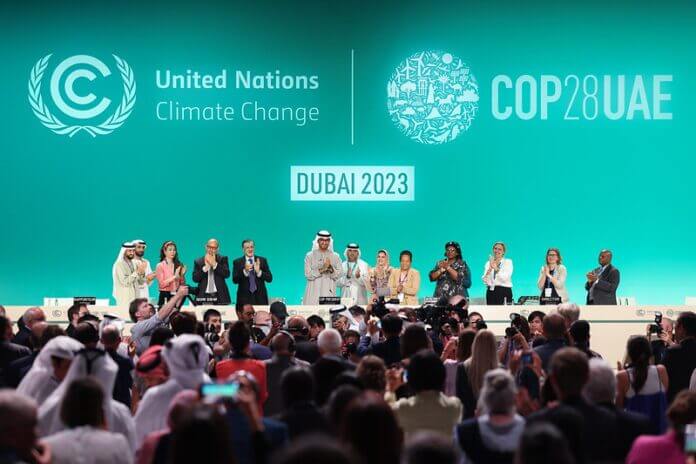COP28 Marks a Pivotal Agreement Pointing Towards the Decline of Fossil Fuels Abdul Basit
COP28 Marks a Pivotal Agreement Pointing Towards the Decline of Fossil Fuels Abdul Basit: Dubai celebrated a momentous occasion as the United Nations Climate Change Conference (COP28) concluded on December 13, delivering an agreement that signifies the "beginning of the end" for the fossil fuel era. The accord lays the foundation for a swift, fair, and equitable transition, emphasizing substantial emissions reductions and increased financial support.
Representatives from almost 200 Parties demonstrated global solidarity in Dubai, culminating in a decision on the world's inaugural 'global stocktake.' This mechanism aims to intensify climate action before the decade concludes, with the overarching goal of keeping the global temperature increase below 1.5°C. UN Climate Change Executive Secretary Simon Stiell, in his closing remarks, asserted, "While we didn't close the chapter on the fossil fuel era in Dubai, this outcome marks the commencement of its end. Now, all governments and businesses must translate these commitments into tangible, real-world results promptly."
The global stocktake, deemed the central outcome of COP28, encapsulates all negotiated elements, offering countries a framework to formulate more robust climate action plans by 2025. Acknowledging the scientific imperative of reducing global greenhouse gas emissions by 43% by 2030 compared to 2019 levels, the stocktake emphasizes the urgency of tripling renewable energy capacity and doubling energy efficiency improvements globally by 2030. Additionally, it calls for accelerated efforts to phase down unabated coal power, eliminate inefficient fossil fuel subsidies, and facilitate an orderly transition away from fossil fuels, with developed nations leading the way.
In the short term, Parties are encouraged to present ambitious, comprehensive emission reduction targets covering all sectors and greenhouse gases aligned with the 1.5°C limit in their upcoming nationally determined contributions by 2025.
Strengthening Climate Resilience and Financial Commitments The conference commenced with the World Climate Action Summit, where 154 Heads of States and Government convened. A historic agreement on the operationalization of the loss and damage fund and funding arrangements was reached on the first day. Commitments to the fund exceeded USD 700 million, reflecting global dedication to addressing climate-related losses.
Further progress on the loss and damage agenda included the establishment of the Santiago Network for Loss and Damage, hosted by the UN Office for Disaster Risk Reduction and the UN Office for Project Services. This platform will provide technical assistance to vulnerable developing countries affected by climate change. Parties also agreed on targets for the Global Goal on Adaptation and its framework, emphasizing the need for financial, technological, and capacity-building support.
Climate finance took center stage at COP28, with the Green Climate Fund (GCF) securing new pledges totaling USD 12.8 billion. Additionally, donor governments committed over USD 174 million to the Least Developed Countries Fund and Special Climate Change Fund, and nearly USD 188 million to the Adaptation Fund.
However, the global stocktake highlights that these financial commitments fall short of the trillions needed to support developing countries in their clean energy transitions and adaptation efforts. To bridge this gap, the stocktake underscores the importance of reforming the multilateral financial architecture and establishing new and innovative sources of finance.
Planning for the Future Looking ahead, COP28 emphasized the importance of a 'new collective quantified goal on climate finance' by 2024, considering the needs of developing countries. This goal, starting from a baseline of USD 100 billion per year, will shape and implement national climate plans due by 2025.
The conference also highlighted the continued work of the mitigation work programme until 2030, with at least two global dialogues annually. Collaboration between governments and stakeholders was strengthened through the Global Climate Action space, providing a platform for showcasing real-world climate solutions.
Inclusivity and Participation COP28 witnessed the participation of world leaders, civil society, businesses, Indigenous Peoples, youth, philanthropy, and international organizations, reflecting a shared determination to address climate challenges. Approximately 85,000 participants attended, fostering the exchange of ideas and partnerships.
Decisions at COP28 underscored the critical importance of empowering all stakeholders, as evident in the Action for Climate Empowerment and the Gender Action Plan.
Charting the Path Forward In parallel with formal negotiations, COP28's Global Climate Action space facilitated collaboration between governments, businesses, and civil society, showcasing practical climate solutions. The High-Level Champions launched the implementation roadmap of 2030 Climate Solutions, aiming to scale up effective measures to halve global emissions, address adaptation gaps, and enhance resilience by 2030.
Looking ahead, COP28 set the stage for a new era of implementing the Paris Agreement through discussions on the 'enhanced transparency framework.' UN Climate Change is developing transparency reporting and review tools, expected to be available to Parties by June 2024.
The conference concluded with the announcement of Azerbaijan as the host of COP29 in 2024 and Brazil as the host of COP30 in 2025. The next two years are deemed critical, with COP29 focusing on establishing a new climate finance goal and COP30 requiring new nationally determined contributions aligned with the 1.5°C temperature limit.
Simon Stiell concluded, "We must put the Paris Agreement fully to work. In early 2025, countries must deliver new nationally determined contributions, bringing us in line with a 1.5-degree world. Every commitment, be it on finance, adaptation, or mitigation, must contribute to this goal. The voices of ordinary people calling for change are essential, and we will be with them every step of the way." COP28 President Dr. Sultan Al Jaber affirmed, "We have found a new path by following our North Star, working diligently to secure a better future for our people and our planet. Our historic achievement is something to be proud of."



